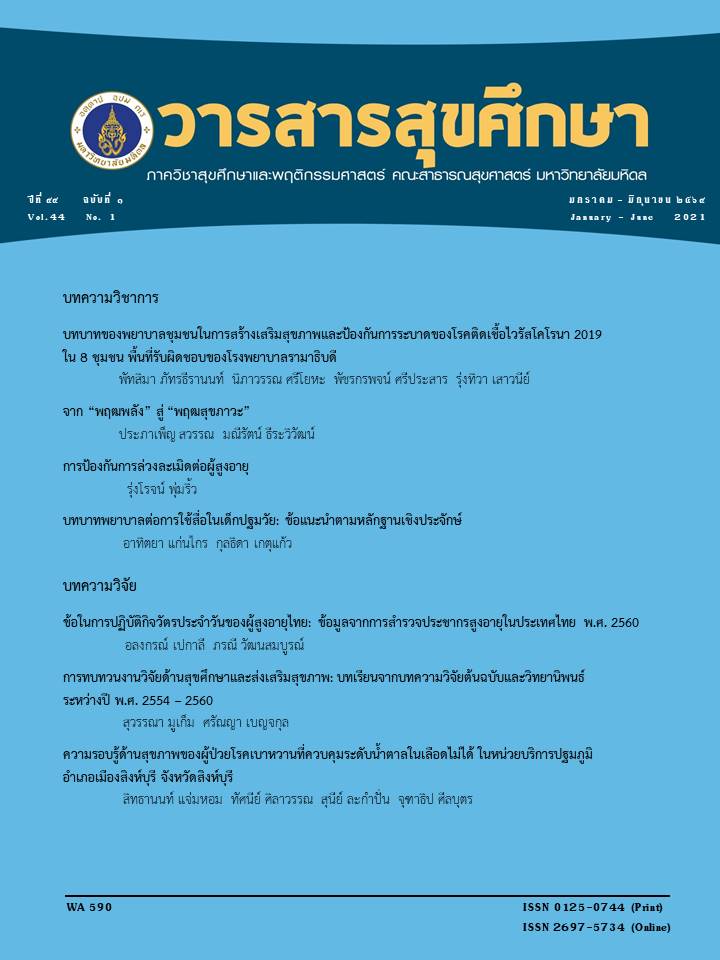Buddhist Counselors’ Experiences in Therapeutic Alliance Development
Keywords:
Counseling psychologist, Therapeutic alliance, Buddhist counseling, Qualitative studyAbstract
Currently, therapeutic alliance is widely recognized as a key factor influencing positive changes in clients. Each psychological counseling theory weighs therapeutic relationship differently. Nevertheless, therapeutic alliance typically plays a major role in the process of counseling in all psychological counseling theories. This research is a qualitative study following the methodology of interpretive phenomeonology to investigate Buddhist counselors’ experiences in therapeutic alliance development. Key informants consisted of five Buddhist counselors; in-depth semi-structured interviews were performed to collect the data. Results revealed six main themes: quiet mind, accurate perception of clients’ internal world; perception of clients’ unwillingness (i.e. an incident in which therapeutic alliance cannot be developed); persistence, aware of one’s own unquiet mind, then get back to the quiet mind and perceive clients’ internal world accurately; readiness, collaborate with clients to untangle life; tranquility, live in alignment with the truth; and the last one is understanding dharma principles as the map of work to untangle life. The results obtained from this study provide insight into psychological experience of Buddhist counselors in therapeutic alliance. That knowledge and understanding can be applied as guidelines for the design and development of more effective counseling treatment plan.
References
Wampold BE. The great psychotherapy debate: models, methods, and findings. Mahwah (NJ): Lawrence Erlbaum; 2001.
Muran JC, Barber JP. An introduction: establishing the context and rationale. In: Muran JC, Barber JP, editors. The therapeutic alliance: an evidence-based guide to practice. New York: Guilford Press; 2010.
Bordin ES. The generalizability of the psychoanalytic concept of the working alliance. Psychotherapy (Chic). 1979;16(3):252-260.
Tuicomepee A, Romano JL, Pokaeo S. Counseling in Thailand: development from a buddhist perspective. J Couns Dev. 2012;90(3):357-361.
โสรีช์ โพธิแก้ว. การสังเคราะห์หลักอริยสัจ 4 สู่กระบวนการปรึกษาเชิงจิตวิทยา/จิตรักษาเพื่อการพัฒนา รักษา และเยียวยาชีวิตจิตใจ: แนวคิด แนวทาง ประสบการณ์ และงานวิจัย. กรุงเทพฯ: หลักสูตรสาขาจิตวิทยาการปรึกษา คณะจิตวิทยา จุฬาลงกรณ์มหาวิทยาลัย; 2553.
สุภาพร ประดับสมุทร. การเกิดปัญญาในกระบวนการปรึกษาเชิงจิตวิทยาแนวพุทธ [วิทยานิพนธ์]. กรุงเทพฯ: จุฬาลงกรณ์มหาวิทยาลัย; 2552.
กวีไกร ม่วงศิริ. การรับรู้ประสบการณ์ด้านจิตใจของพนักงานภายหลังได้รับการปรึกษาเชิงจิตวิทยาแนวพุทธ [วิทยานิพนธ์]. กรุงเทพฯ: จุฬาลงกรณ์มหาวิทยาลัย; 2557.
Smith JA, Flowers P, Larkin M. Interpretative phenomenological analysis: theory, method and research. London: SAGE Publications Ltd; 2009.
ชมพูนุท ศรีจันทร์นิล. การวิเคราะห์เชิงปรากฏการณ์วิทยาแบบตีความ: ระเบียบวิธีวิจัย เชิงคุณภาพสำหรับการวิจัยทางด้านจิตวิทยา. ว. ศึกษาศาสตร์ 2560;28(3):1-13.
Binder P, Holgersen H, Nielsen GH. Re-establishing contact: a qualitative exploration of how therapists work with alliance ruptures in adolescent psychotherapy. Couns Psychother Res. 2008;8(4):239-245.



